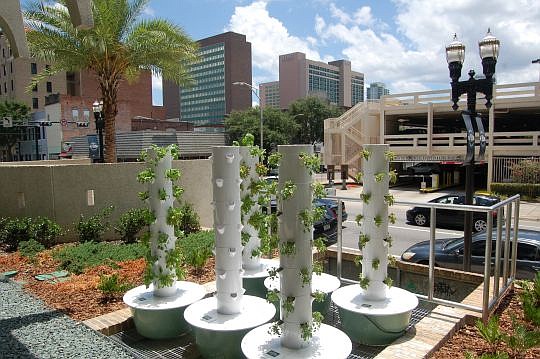
If you ask someone who works at the YMCA of Florida’s First Coast administrative offices Downtown how their garden grows, they might reply “straight up.”
Six “tower gardens” are in operation along Forsyth Street at the Jessie Ball duPont Center.
Each can produce enough kale and lettuce every four to six weeks to make salad for nearly 250 people — or provide food for hungry families — said Sara Glenn, YMCA’s director of strategic development of healthy living innovations, nutrition and obesity.
The project, “SEEDifferently,” is a partnership between the YMCA and Atlantic Beach Urban Farms, a commercial aeroponic farming operation.
Since the first tower was planted about one year ago, the program has grown to include more than 20 towers at 11 YMCA branches in Northeast Florida, several public and private schools, and at JEA’s Downtown headquarters.
Thousands of seedlings have been planted, leading to about 140 harvests that resulted in providing nearly 700 meals for children and families.
“It’s a way to reach the community and we want to bring something new to health improvement education,” Glenn said.
The concept behind the aerial agriculture is similar to Downtown real estate in that when it’s vertical, more office or residential space can be created on the same amount of ground.
Crops in vertical gardens grow on average 30 percent faster than those grown in soil, use 90 percent less land and water than traditional growing and recycle 100 percent of nutrients and water.
“They are very easy to maintain,” Glenn said. “We’ve had very few problems.”
The concept behind what happens after the harvest is about education and improving access to healthy food in the community.
The growing program fits with the Y’s mission of youth development, healthy living and social responsibility.
In addition to using the produce to teach children where their food comes from and how to prepare fresh vegetables, a portion of the harvest is donated to food pantries at Catholic Charities and the Salvation Army of Northeast Florida, said Glenn.
Plans include expanding the program into more schools and promoting vertical gardening in “food desert” neighborhoods where fresh fruit and vegetables aren’t easily accessible in stores.
Getting the business community involved is another part of the plan.
Glenn said the Y has a “traveling tower,” available for loan to companies that would like to give vertical gardening a try for a month or two.
“The initiative has really taken off. People get excited,” she said.
For more information about vertical farming at the Y, email [email protected] or call (904) 265-1804.
@DRMaxDowntown
(904) 356-2466